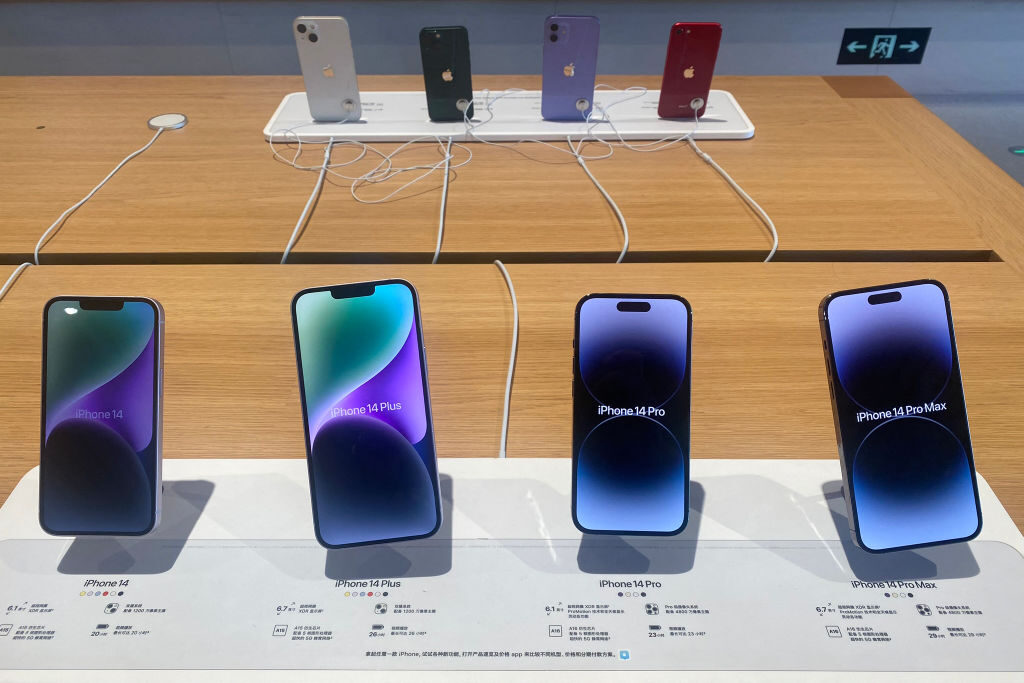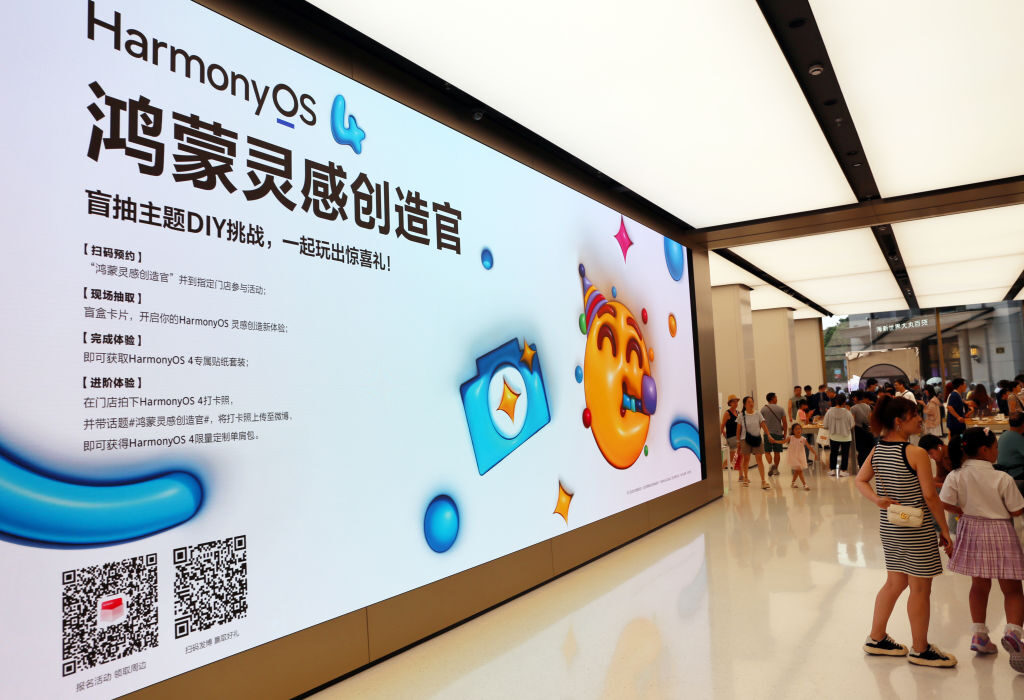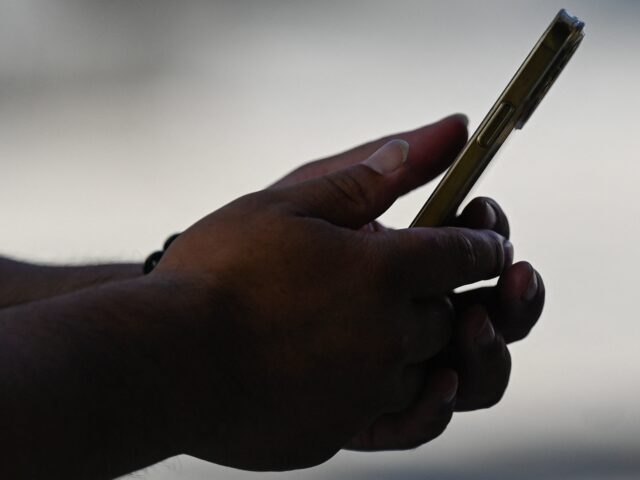The Chinese Foreign Ministry accused Apple’s iPhone models of having unspecified “security issues” during its regular press briefing on Wednesday, rejecting reports that Beijing had banned government officials from using them but nonetheless disparaging the product.
Foreign Ministry spokeswoman Mao Ning’s ominous suggestion that iPhones pose a threat to the privacy of their users mirrored years of accusations against the Chinese company Huawei, whose technology Western officials have long accused of having “back door” access implemented to allow the company to share private information with the Chinese Communist Party. Multiple Western countries, including America, have banned Huawei technology and sanctioned the company as a national security threat.
“We have evidence that Huawei has the capability secretly to access sensitive and personal information in systems it maintains and sells around the world,” then-National Security Adviser Robert O’Brien said in 2020.
“Barely a day passes without there being new evidence that Huawei is an existential threat to the safety of the state,” Former British Brexit Secretary David Davis lamented at the time.
Ren Zhengfei, the CEO of Huawei, has openly admitted to being a Communist Party member and has described his “loyalty” to customers as consistent with the teachings of the Party. Ren described the cornerstone of being a member in good standing of the Party as having “faith” in a 2019 interview.
Conversely, the Chinese government has treated Huawei favorably, publishing promotional material for the company – including a bizarre video of children singing an anthem featuring the lyrics “we love our country, we love homegrown brand Huawei” – and defending it against accusations of security breaches.
The Chinese Foreign Ministry’s alleged concern over iPhone “security issues” followed the surprise rollout of Huawei’s new Mate 60 series of phones, which the Chinese regime propaganda outlet Global Times suggested included a “made-in-China 5G capable chipset.” A potentially domestically made chip could indicate that China has developed new technology in response to restrictions by the U.S. government on selling the critical technology to China. The Communist Party’s favored technology companies have been actively attempting to fill the void. ByteDance, the Chinese corporation that owns Tiktok, announced in July 2022 that it would begin attempting to manufacture computer chips in the near future.
Mao Ning, the Chinese Foreign Ministry spokeswoman, addressed the mobile phone competition after being asked about a report by the Wall Street Journal last week in which the newspaper claimed that the Communist Party had ordered government officials not to use iPhones or other foreign devices for their work business.
“Chinese leader Xi Jinping has been emphasizing national security as its rivalry with the U.S. intensifies, leading to a tightening of state control over data and digital activities in recent years. In July, China started implementing an expansive update of an anti-espionage law,” the newspaper claimed.
The American government and others in the West have banned the use of Huawei technology on similar grounds.
Mao denied that such a ban on iPhones is in place and did not mention Huawei, but appeared to warn the Chinese public that the Apple products could threaten their privacy.

iPhone 14 models are displayed at an Apple store in Beijing on September 12, 2023. (PEDRO PARDO/AFP via Getty Images)
“China did not issue any law, regulation or policy document that bans the purchase and use of cellphones of foreign brands, such as iPhone,” Mao said. “However, recently we did notice media reports about security issues related to iPhone.”
“The Chinese government attaches great importance to cyber and information security and treats Chinese and foreign companies as equals. We hope all cellphone companies operating in China will strictly abide by China’s laws and regulations,” she concluded.
Mao did not identify any such media reports on the iPhone or clarify what kind of “security issues” the Chinese government was concerned about.
China is a pivotal market for Apple, where the iPhone is popular as a luxury product. Apple made 19 percent of its total fiscal year 2022 revenue in China, totaling $74 billion. According to Reuters, the majority (67 percent) of mobile phones priced over $600 sold in China in the first half of 2023 were made by Apple. Huawei, also the top competitor to Apple globally, sold only 15.6 percent of phones in this price range. The difference is largely a product of Huawei keeping its products far more affordable, though both companies have been credibly accused of manufacturing their phones using Uyghur slaves.

Customers shop at Huawei’s flagship store in Shanghai, China, August 24, 2023. On September 12, 2023, after the release of Apple’s IPHONE 15 smartphone, the stock price fell 1.71% at the close of the US stock market, and the market value disappeared by more than 47 billion US dollars. (CFOTO/Future Publishing via Getty Images)
Apple debuted its latest model, the iPhone 15, in China on Wednesday, shortly before Mao’s tacit warning not to buy them. The state-run Global Times predicted the phone would fail not as a result of government pressure on the public not to purchase it, but “fiercer competition” from companies such as Huawei and Apple’s alleged failure to offer “technological innovation.”
“Freshness comes from mystery. Everything that was released at today’s event was exactly as previously revealed, so the products didn’t blow consumers’ minds,” tech analyst Liu Dingding told the propaganda outlet regarding the Apple debut.
In contrast, the state media outlet heralded the Huawei Mate 60 series as a victory in “Huawei’s efforts to build up an in-house, de-American industrial chain” and congratulated the company on a “moment of rebirth” following years of condemnation and sanctions abroad. The Global Times noted Huawei’s predicted success was in part the result of “China’s ability to conduct independent technological research and development amid US’ ruthless crackdown in the high-tech sector.”
Follow Frances Martel on Facebook and Twitter.

COMMENTS
Please let us know if you're having issues with commenting.